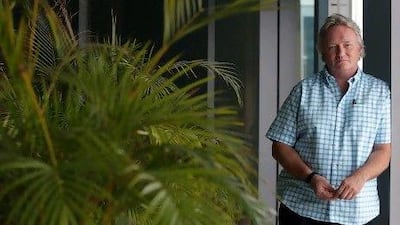Terrence Bramble's career is a study in contrasts - from the British army to the glitz of Vogue and Tiffany, and from the security industry in Colombia and Iraq to Dubai's flower sector
I believe you rose pretty high in military intelligence. Tell me, if you can, about your early career.
Actually I did not work in military intelligence but as a close personal aide, first to the deputy supreme allied commander of Europe and subsequently to the head of the British army. Our work brought us into daily contact with high-level assessments and reports from the intelligence community. I can't say much more, really. It was all on a "need to know" basis.
What did you do after the army?
When I left, my life took a 180-degree turn and I went to work for the magazine Vogue on the publishing side. It was there that I learnt one of the skills you needed to survive in the cut-throat world of "civvy street": the not-so-fine art of selling.
Was retailing and marketing an enthusiasm of yours?
It was becoming so. I left Vogue to join Tiffany & Co. Their London branch was their first foray into the international retail scene, the brainchild of Rosa Monckton, who was well known in the London jeweller scene. Rosa recruited me to establish the corporate gift business. Within a short time we were contributing a high proportion of the London store's profits.
So what was the next step? How did you get to Colombia?
I had established a management consultancy focused on retail, but at the same time I was helping a number of charities, which meant I did not receive any payment. It was time for a change, and fate intervened. I was driving in London, and pulled over to take a call from an old friend who was running a security business in Bogota, Colombia. He offered me a position. I looked up as I pulled away to see a blue plaque on the house where I had stopped. It said Simon Bolivar, the founder of "Gran Colombia", had lived there. An omen. I was in Colombia for 10 years, and I suppose you could call it a challenging business climate, from the drug cartels to the revolutionary guerrillas. We developed a programme to deny the industry's US flower shipments to the traffickers, which had become a favoured means of shipping cocaine.
What made you set up in the flower industry in the UAE?
After Colombia, I went to Iraq with the security industry. At the time, Iraq was the heart of darkness, with a level of deadly incidents that made Colombia look like a playground. My nine lives were being rapidly used up and it was time for another change. On a trip to a security conference in Dubai, I passed the Dubai Flower Centre. It was my eureka moment. I was staying at the Grand Hyatt, which was awash with flowers. The hotel's florist manager told me most were from Africa, but Colombian ones were better. They were larger and lasted longer. I did some market research, the rest is history.
Where did the idea of Andean Arabian Flowers come from?
The majority of the 450 farms in Colombia are to be found on the Savannah of Bogota, a plain 2,620 metres high in the Andean mountains. So, from the Andes mountains to the deserts of Arabia.
Tell me about the flower business in Dubai? How competitive is it?
It's a market historically driven by supply, and not used to buying good quality at a premium. It's been dominated by two large players for more than 20 years, so it's been an uphill struggle to break in.
How is the business doing?
In 2008, we had a very good year with our main client, Spinneys. From 2009 we started to feel the pinch. The hotels and the hospitality sector, a large part of our business, were hard-hit. Clients were forced to cut costs and buy cheaper. We were 20 per cent down on 2008 and 2010 was no better. The hardest part of the recession has been the difficulty in chasing debtors, particularly the wholesale clients who themselves have cash flow issues. This year we are seeing signs of recovery.
Where is the growth?
We are talking to some not-so-obvious, successful and well-managed retailers here in the UAE that certainly don't compete with my existing clients. Companies that appreciate the power of quality. It's early days to mention names, but watch this space.
What's next?
Certainly no more 180-degree changes. This is it, I enjoy living here in Dubai, I have established a business here. Plan A is to run a successful business that can sustain itself, that will grow back with the recovery of Dubai. Who knows where that will take us in 10 years?

Terrence Bramble: A career shaped by guns and roses
Terrence Bramble's career is a study in contrasts. Frank Kane talks to him about guns and roses.
Most popular today
